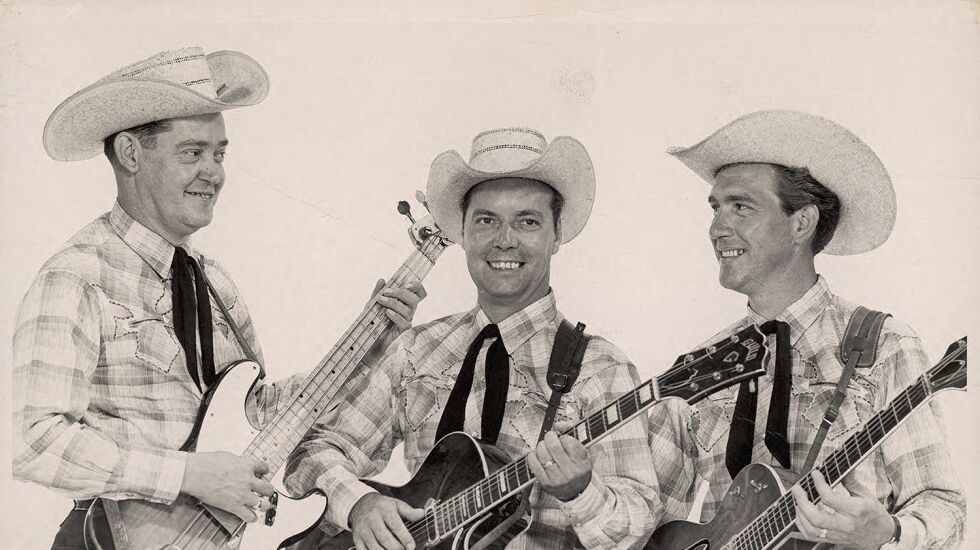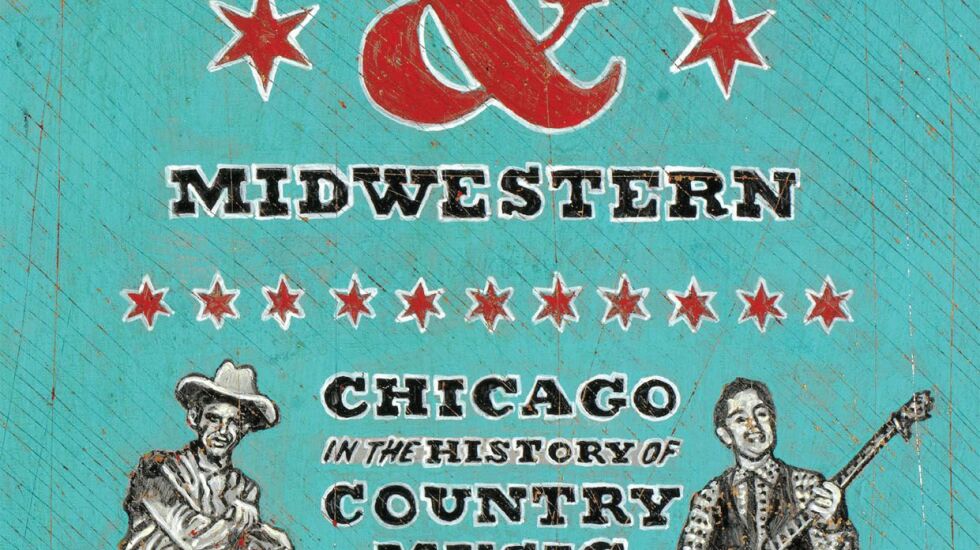
Before Jethro Burns turned to teaching, he first thought Homer & Jethro might continue if he had a new partner.
Curt Delaney was the obvious choice. Delaney, a fellow Southerner who grew up in Moultrie, Georgia, had been playing country guitar in Chicago since he was hired as a staff musician for “Don McNeill’s Breakfast Club” in 1952. One night at the Old Town School of Folk Music, Burns asked if he’d consider the job, but Delaney turned him down. He already had a band.
That band, the Sundowners, never achieved the fame of Homer & Jethro or any other national country and Western act because its members chose to have the world come to them.
Between 1959 and 1989, the Sundowners — Delaney, Don Walls and Bob Boyd — played every Wednesday through Sunday night in a subterranean club in the Loop that over time served as a hangout for a cross-section of nightlife — pimps, prostitutes, drug pushers, barflies but also conventioneers, celebrities like Robert Duvall, Fats Domino and John Entwistle of the Who, country singers like Webb Pierce, Gene Autry, Mel Tillis and Faron Young, columnist Mike Royko, middle-class suburbanites on a night out and, near the end, young punks from the indie rock scene who saw all three musicians as icons of country authenticity.
“Growing up in the suburbs, I thought, ‘Hey, this is great, everything they warned me about,’ ” said musician Kent Rose.
The allure was not just in the rough setting but in the trio’s magnetic vocal harmonies, craftsmanship and commitment to weaving together a wide range of music without showing the stitching — a skill made possible by thousands of hours logged on the bandstand over decades.
Like Burns, they were displaced Southerners who headed to Chicago seeking a better life. Walls, the son of a coal miner, was born in Rita, West Virginia, on Dec. 4, 1930. He picked up the guitar at a young age. As early as 1949, he was roaming the country playing county fairs, festivals, nightclubs, VFW halls and radio barn dances as a member of the Circle C Boys, a guitar, bass and accordion trio fronted by a colorful leader named Curly Coldiron, a North Carolina native who played the upright bass and shot blanks from a pistol when leaping onstage. The group appeared on the “WLS Barn Dance” and joined bills with Homer & Jethro, Rex Allen and Lulu Belle and Scotty, among others, as part of the packaged tours the station sent around the Midwest.
Boyd, from Chattanooga, Tennessee, had moved to Chicago as a boy and ended up working the Madison Street honky-tonks. Eventually, he, too, joined the Circle C Boys. When Coldiron retired in 1959, Delaney was hired to replace him.
The Sundowners took their name from the title of a 1960 Robert Mitchum movie. Their home club could have floated in from the back lot of a Hollywood Western. The Ringside Ranch opened in 1948 at 5 N. Clark St. and featured country bands until the building was torn down in 1959 to create a parking lot. Co-owner Michael Scheid was convinced country music needed to remain in the Loop.
“They told him he was crazy and that it would never make it. But he had been in the service and had met a lot of country boys, and he figured they would be coming to Chicago,” said his wife Barbara.
Three years later, in 1962, Scheid reopened his bar around the corner in the basement of 56 W. Madison St. and called it the Bar R-R Ranch. When that location also fell to the wrecking ball, in 1977, he moved one more time, to 56 W. Randolph St., between the city’s Greyhound bus station and the Woods Theatre, a dilapidated 1922 movie palace showing kung fu and horror fare.
In the heart of the financial district, the Ranch provided a quick escape to another time and place. A nondescript doorway led visitors down a short flight of stairs into a saloon decorated with wall-mounted animal heads, horns, barbed wire, a leather-encrusted map of Texas and a glass display case of antique pistols. Arranged on the floor were small wooden tables, their round tops carved with graffiti by knives. A sign advertised the “world’s best chili” in 30 varieties. If things got out of hand, the cook, a former professional wrestler named Little Bill, stepped out of the kitchen and intervened.
“When the parties get a little wild, you might find someone who wants to pull a little strip show, and I’ve got to stop them,” he explained.
The band drew from a repertoire of more than 15,000 songs. Everything was fair game — Hawaiian guitar, jazz, early rock and roll, novelty, Western swing and, of course, every flavor of country, from cowboy songs to disco steppers. Four books of songs were always close by, but all three musicians mainly played by ear, bending the familiar songs into versions that were unmistakably their own.
“It takes a lot longer to learn it the other way, and then you’re playing somebody else’s feelings. But, if you play by ear, you play it how you feel it,” Delaney once explained.
The hallmark of their sound was three-part vocal harmonies, polished by Walls’s falsetto and the flash of his steel guitar.
“Watching those guys perform was like watching someone fill a glass of water —effortless, smooth and perfect,” said musician Peter Nye.
For young musicians in the audience, the band’s seven half-hour sets were their night school.
“They may have been on automatic pilot, but their automatic pilot was such a high caliber, they were an absolute model for what it was to be a musician,” said musician Roger Bellow, the nephew of novelist Saul Bellow.

All three Sundowners recognized that younger faces were coming to see them, and their response was to widen the stage to invite them up to play and, in true folk tradition, teach them what they needed to learn.
Despite needing to be at his post office job in the suburbs by sunup, Kent Rose spent nights at the Ranch, first observing the band from the bar, then sitting in with them and eventually being hired to perform solo during breaks. He had already spent more than a decade playing in country bands, one of which had backed Tanya Tucker for nearly a year on the road, but playing with the Sundowners had forced greater sophistication in his playing.
“One night, they called [the early jazz standard] ‘Limehouse Blues,’ which I never heard of. I asked Curt what it was like. He said ‘a circle of fifths,’ but I didn’t know what that was, either. So he said, ‘Just chunk along on rhythm,’ and I did until I learned it,” he said.
One band that descended the Ranch stairs in 1987 was the Mekons, a British art-punk band that one year earlier had released “Fear and Whiskey,” considered one of the first alternative country records for its barroom fiddle, steel guitar and honky-tonk piano cover of Leon Payne’s “Lost Highway” as well as songs that raged against the inequities of capitalism and social engineering. During a Chicago stop on a tour of the United States, the band, enamored with Americana, bought cowboy shirts at a Western wear shop and were then directed to the Loop to see the Sundowners in action.
“It was somewhere I had dreamed of being, but yet, when it actually happened, it was totally terrifying,” said Jon Langford, a Mekons co-founder.
By the end of the night, the Mekons, too, were onstage, playing covers of songs by Buck Owens, Merle Haggard and Johnny Cash.
“The only way I was able to play any of that music in the States was because I had that experience,” said Langford.
The Sundowners recorded only two studio albums over their three decades at the Ranch, one produced by Lloyd Maines, a Grammy-winning producer and steel guitarist who is the father of Dixie Chicks singer Natalie Maines.
But, in 1994, they were invited to contribute two songs to “For a Life of Sin: A Compilation of Insurgent Chicago Country,” a record that ended up serving as a mission statement for a new record label in town: Bloodshot Records. Operated by three twentysomethings, the label was formed to document a new scene that referred to an older form of country.
The Sundowners served as a local touchstone for this eclectic generation, which included Langford, the Bottle Rockets, Robbie Fulks and the Handsome Family. By that point, in 1989, the Sundowners had moved out of the Loop. They briefly operated the Sundowners Ranch, a restaurant and lounge in Franklin Park. They also started playing rock clubs like Lower Links and Lounge Ax, where the indie-rock audience sought them out.
Eventually, their new audience reciprocated: On Dec. 1, 1993, at Bub City, a North Side bar, a roster of bands as eclectic as the Mekons and the Texas Rubies paid them tribute. The attention even motivated Mayor Richard M. Daley to issue a proclamation naming the day in their honor.
Four years later, Delaney died, followed by Boyd in 1999 and Walls in 2011.
For a band so wired to the glories of country’s past, standing on the stage that day with a new generation let them glimpse the future.
To Delaney, the adulation that came so late in his life was a revelation: “I never thought it would come to this.”







